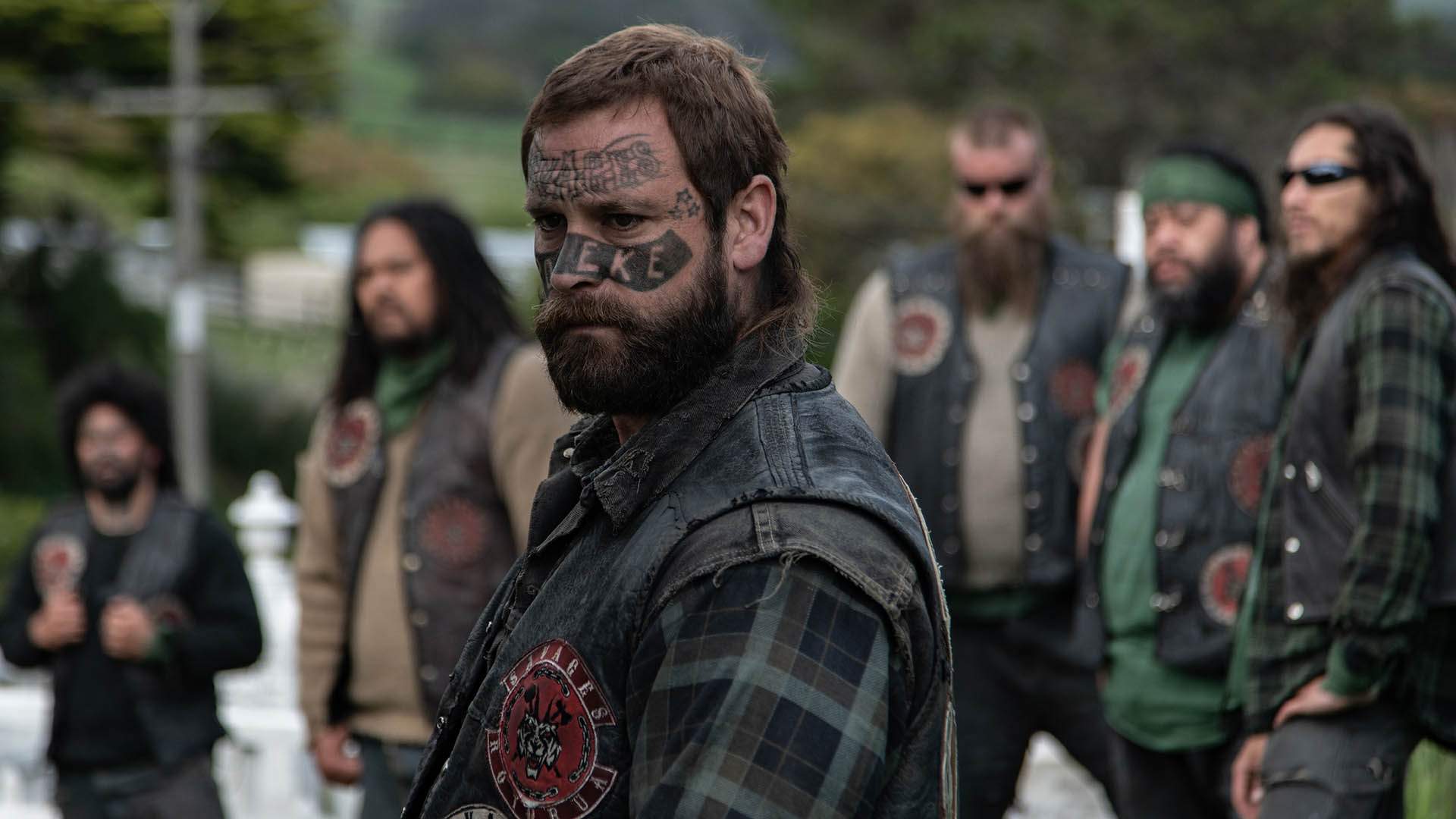Savage
Following a gang member's troubled childhood, tumultuous adolescence and brutal adult years, this weighty New Zealand drama benefits from a strong lead performance.
Overview
UPDATE, January 27, 2021: Savage is available to stream via Stan and Amazon Video.

Tattoos covering his cheeks, nose and forehead, a scowl affixed almost as permanently, but raw sorrow lurking in his eyes, Jake Ryan cuts a striking sight in Savage. He's a walking, drinking, growling, hammer-swinging advertisement for toxic masculinity — how it looks at its most stereotypical extreme, and how it often masks pain and struggle — and the performance is the clear highlight of the Home and Away, Wolf Creek and Underbelly actor's resume to-date. Playing a character named Danny but also known as Damage, Ryan also perfectly epitomises the New Zealand gang drama he's in, which similarly wraps in-your-face packaging around a softer, richer core. Savage's protagonist and plot have had plenty of predecessors over the years in various ways, from Once Were Warriors' exploration of violence, to Mean Streets' chronicle of crime-driven youth, plus the bikie warfare of TV's Sons of Anarchy and even Aussie film 1%, but there's a weightiness on display here that can't just be wrung from a formula.
That said, although first-time feature director and screenwriter Sam Kelly takes inspiration from NZ's real-life gangs, and from true tales from within their ranks spanning three decades, Savage does noticeably follow a predictable narrative path. Viewers first meet Danny in 1989, when he's the second-in-charge of the Savages, which is overseen by his lifelong best friend Moses (John Tui, Fast & Furious: Hobbs & Shaw, Solo: A Star Wars Story) but is also under threat by rank-and-file members agitating for a leadership challenge. In-fighting, and Moses' sheer desperation to remain on top, aren't Danny's biggest issues, however. Whether imposing the ramifications of being disloyal upon a younger colleague or being unable to relinquish control in an intimate situation, he's both tightly wound and silently aching, and he's also unable to shake the cumulative effect of all the factors and decisions that have led him to this testosterone-saturated point.
A series of flashbacks, each fittingly moody and tense, explain why Danny is in his current situation physically, mentally and emotionally. The film first jumps to 1965, when he's nine (played by Pete's Dragon's Olly Presling), victimised by his overbearing father and sent to juvenile detention, where he initially meets and befriends a young, wild-haired Moses (Lotima Pome'e). The circumstances leading to Danny's stint in custody and his treatment while he's there each leave an imprint, with Moses swiftly becoming the only person that he can count on. Skipping forward to 1972, when the pair are in their late teens (played by James Matamua and Haanz Fa'avae-Jackson), they establish the Savages — and, although it gives them a sense of belonging that's absent elsewhere, they're soon caught in a Wellington turf war with a rival gang.
Yes, all of the above narrative elements have a well-worn feel to them, but a blandly, routinely by-the-numbers flick isn't the end result here. Aided by suitably gritty and restless camerawork that mirrors Danny's inner turmoil, the film packs a punch when it lets that unease fester in quiet moments. It's also particularly astute when honing in on Danny and Moses's complicated friendship, and how pivotal it is throughout their constantly marginalised lives. There's never any doubting that Savage is a movie about family, including the traumas they can inflict, the hurt that comes with being torn away from loved ones at a young age, the kinship found in understanding pals and the concept of brotherhood in gangs, and the feature is at its most affecting when it lets these truths emanate naturally.
Kelly does like to stress the point, though, and to do overtly. Indeed, the clunkiest parts of Savage involve Danny's yearning to see his mother and his tussles with his older brother Liam (played by Jack William Parker as a teen and Seth Flynn as an adult). Every year Danny, stands outside his childhood home, looks on at his parents and siblings and, unable to step into the yard, notches a mark on the fence outside — and it's an instantly and repeatedly overdone touch. When he's reunited with Liam, it's because the two brothers are in opposing crews, another obvious, template-esque inclusion that's far less effective or moving than seeing how Danny navigates the gang he has chosen as his new family.
Unsurprisingly, Danny's gang life is brutal and violent, which Savage doesn't shy away from in a visual sense. Tonally, the film aims for Shakespearian levels of tragedy, too, as Sons of Anarchy did before it. But while most of the feature hits its marks, draws viewers in and keeps them interested, the movie's biggest force and asset is always Ryan. Tui also proves a commanding screen presence, as does first-timer Alex Raivaru as the latter's nemesis, while young Presling and Pome'e share a convincing rapport. When an actor plays the kind of immediately imposing role that Ryan is tasked with, however, how they handle the subtler side of the character is pivotal — and audiences can feel Danny's bubbling distress even when he's the most formidable figure figure in the room.
Top image: Domino Films, Matt Grace.





